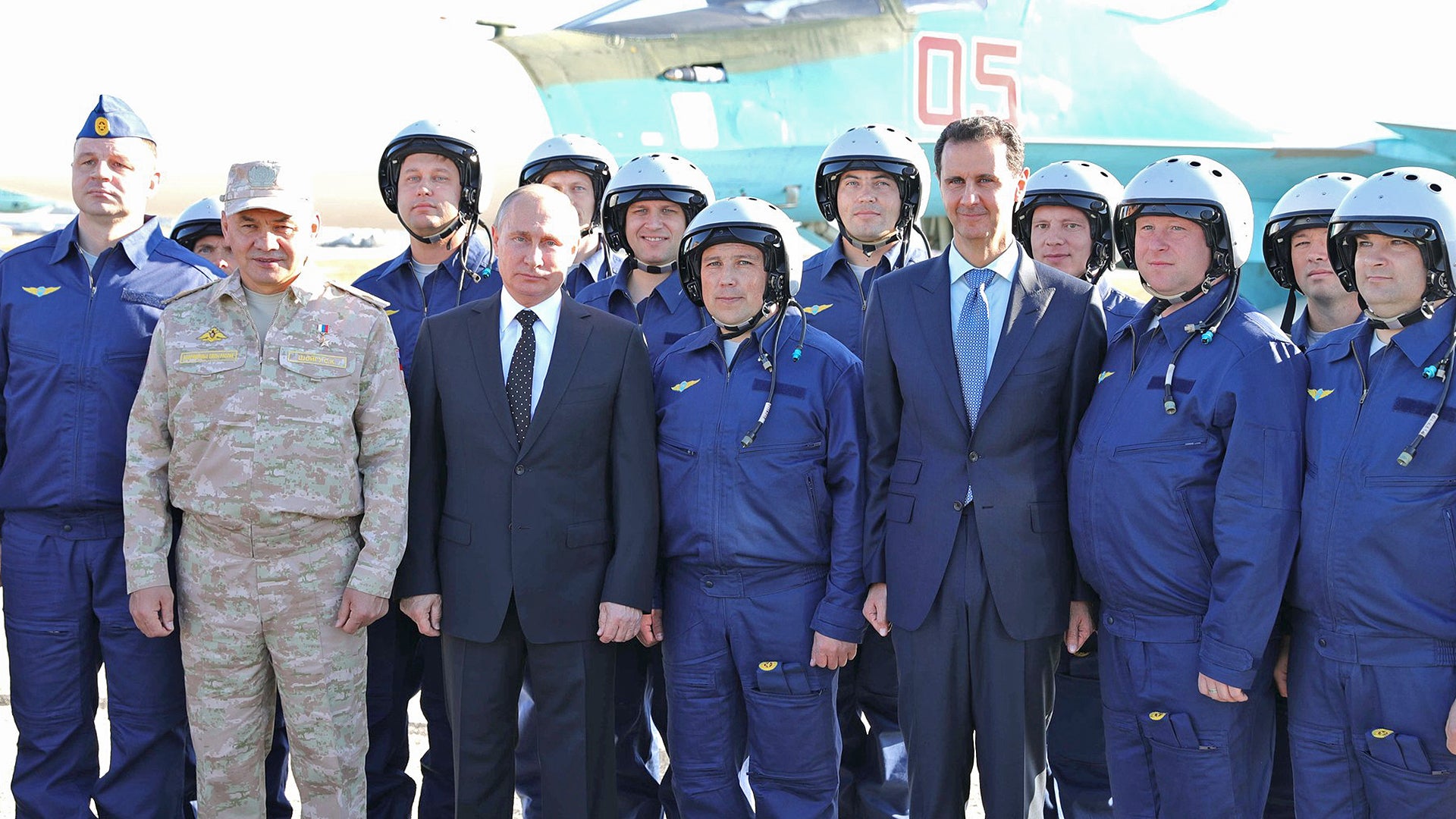Russia’s President Vladimir Putin has made an unannounced, but triumphant stop in Syria ahead of trips to Egypt and Turkey, ostensibly to declare victory over terrorist elements in the country and announce a troop withdrawal. Rather than marking the end of an era, the Russian leader’s visits underscores the Kremlin’s significantly expanding presence in the Middle East and role in its political and military affairs.
On Dec. 11, 2017, Putin touched down at Russia’s Hmeimim Air Base near the Syrian city of Latakia in a Tu-214PU. Su-30SM fighters had escorted the aircraft, one of the Russian government’s latest strategic airborne command posts, or “doomsday planes,” which has the ability to serve the needs of the country’s leaders during a nuclear war or other major global crisis, into the embattled country. The Tu-214PU is loosely analogous something of a cross between the U.S. E-4B Nightwatch and the C-32A.

Media captured during the event showed the base brimming with aircraft and other activity, including Su-35 advanced Flanker, MiG-29SMT Fulcrum, and Su-34 Fullback multi-role fighter aircraft, Su-24 Fencer and Su-25 strike jets, and Il-76 transports, an A-50M airborne early warning plane, an Il-22PP electronic warfare platform, and various other types, along with helicopters and air defense gear.
After landing, Putin reviewed and met with various Russian military personnel at the base, accompanied by Russian Defense Minister Sergei Shoigu and a noticeably giddy Syrian dictator Bashar Al Assad, among others. The trio then received a briefing in the “quaint” operations center at Hmeimim Air Base and had a meet-and-greet over coffee with what appeared to be a specially selected group of young Russian troops.
“Over slightly more than two years, the Russian Armed Forces have routed together with the Syrian army the most combat-capable grouping of international terrorists,” Putin said during a speech on the tarmac. “In view of this, I have made a decision: most of the Russian military contingent staying in the Syrian Arab Republic is returning home, to Russia.”
“You are coming home with a victory, to your relatives, parents, wives, children and friends,” he continued. “Your Motherland is waiting for you, my friends. Have a safe trip home and thank you for your service.”

Back in June 2017, Assad had made another very public visit to the base, a particularly visible display of the Russian-Syrian alliance. This latest surprise appearance was clearly a Putin-focused affair to celebrate Russia’s successes and at one point a Russian official appeared to prevent Assad from sharing the Russia’s president limelight in front of the cameras.
On Dec. 6, 2017, Chief of Russia’s General Staff and First Deputy Defense Minister, General of the Army Valery Gerasimov, announced that Syria was entirely free of ISIS. The Russian Ministry of Defense also extended an offer to help the United States and its international coalition battling the terrorists in Iraq and Syria.
On Dec. 9, 2017, Iraqi Prime Minister Haider Al Abadi announced that ISIS was totally defeated in his country, too. There have since been reports of continued fighting against the terrorists in both countries, including more Russian air strikes in Syria.
The idea that any party has completely destroyed ISIS in either Syria or Iraq is an extremely dubious. The core of the organization, including leader Abu Bakar Al Baghdadi, are in hiding, but have so far been able to elude capture and targeted strikes, all while inspiring individuals around the world to launch attacks and forming connections with established militants. The remnants of ISIS are unlikely to simply disperse and the group, an evolution of Al Qaeda in Iraq, could even rebrand itself yet again.

Furthermore, both Assad’s Partner Hezbollah and U.S.-backed Syrian Defense Forces have cut deals in the past with ISIS that has allowed its members to slip away in exchange for evacuating them from certain areas. There is little indication of a long-lasting political settlement between the regime in Damascus and the myriad actors still opposed to it and the Russians know this.
“If terrorists again raise head, we will deliver such strikes on them that they haven’t seen so far,” Putin declared at Hmeimim. He added that the “memory” of sacrifices the country’s security forces made against terrorists and militants both in Syria and in Russia “will give us an additional force to eradicate that absolute evil – international terrorism – no matter under what guise it hides.”
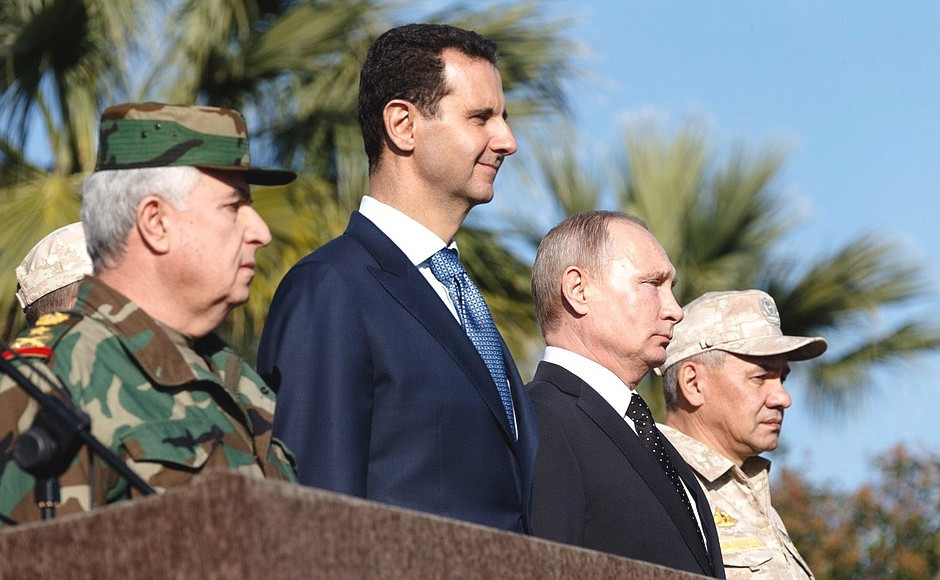
It’s already unclear exactly what Putin’s draw down will amount to, whether it actually involves a large reduction in the total size of Russian forces in Syria long term, rotating new units in to take the place of existing troops, or simply ending active combat operations and sending personnel back to the garrisons at Hmeimim and Russia’s naval base in the Syrian city of Tartus. The Russian president has announced major withdrawals
in the past and in those cases the result was primarily a change in the composition of the contingent in country after a short reduction in overall footprint.
Regardless, Putin’s announcements do represent practical and political victories for both Russia and Syria. The Kremlin, along with Iran and Iranian-backed proxies, was instrumental in saving Assad from certain defeat at the hands of a mixture of rebels and extremist groups in late 2015.
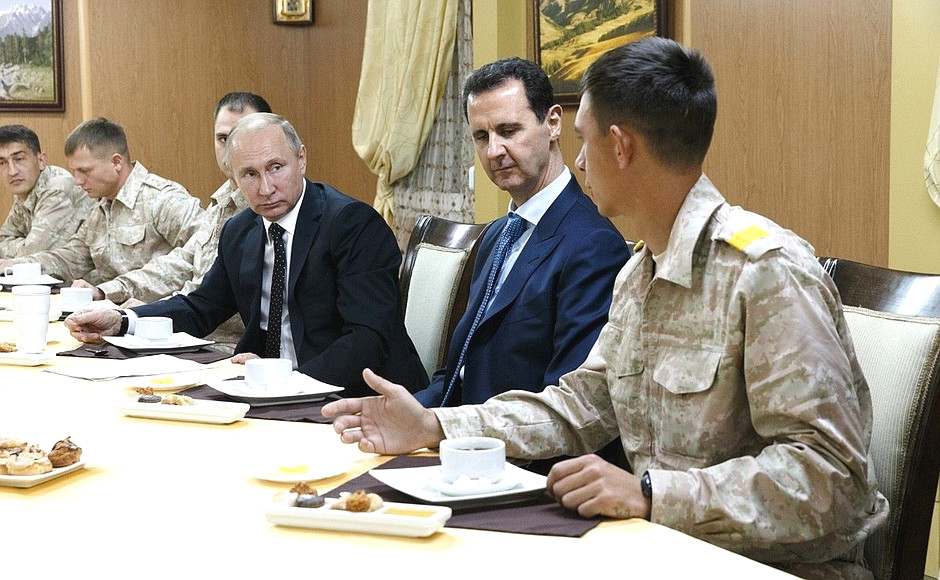
With Moscow’s support, the government in Damascus has stabilized the situation in the western portion of the country, routed rebels to the east, and has now been able to turn its attention to re-establishing authority all the way to the Iraqi border. In the process, Russia has secured strategic basing deals to continue operations at Hmeimim and Tartus for decades to come. Tartus is particularly important, giving the Russian Navy a key warm water port outside the bottleneck of the Black Sea to support operations in the Mediterranean, the Middle East, and beyond. Securing these strategic assets over the long-term was clearly one of the primary motivations behind the Kremlin’s decision to step into Assad’s mess.
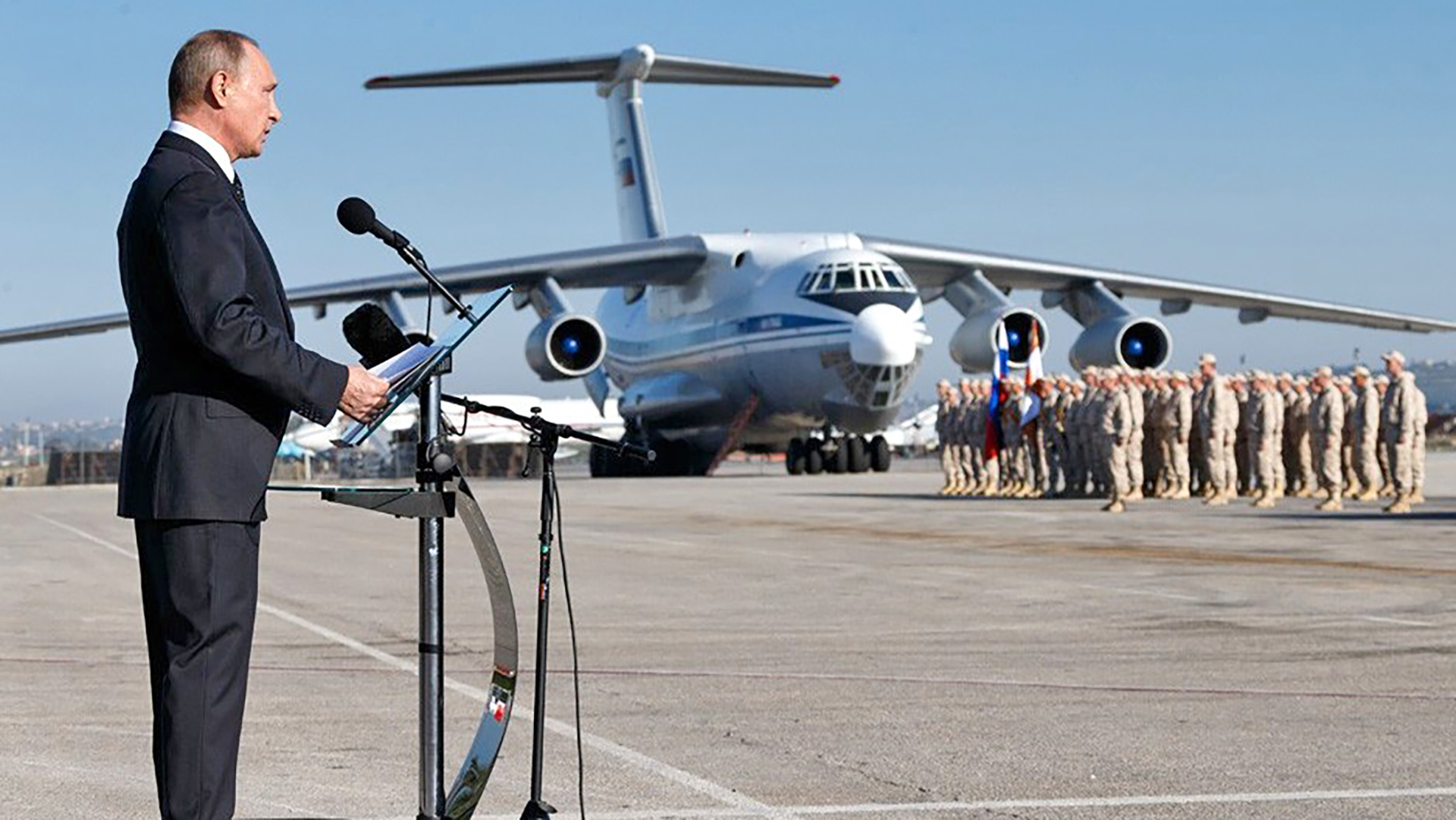
And after his jubilant stop in Syria, Putin flew to Egypt, where the larger Il-96 presidential plane, similar in form and function to the U.S. Air Force’s VC-25A, known popularly by its call sign when the President is on board, Air Force One, was waiting to take him further on. This visit is another visible example of Russia’s growing influence throughout the Middle East and North Africa, even among traditional American partners, including Egypt, the United Arab Emirates, and Saudi Arabia.

Egyptian President Abdel Fattah el-Sisi, who came to power following a coup in 2013, has been actively supporting rogue General Khalifa Haftar’s efforts to take control of Libya and has now found himself battling an ISIS franchise in the Sinai Peninsula. At the same time, President Barack Obama’s administration had limited ties and military aid to Sisi’s government over human and political rights concerns, prompting the Egyptian leader to turn to Russia for assistance in these efforts and other areas.
U.S. President Donald Trump had reversed course and appeared to be mending relations with Sisi, who he met with during a state visit to Saudi Arabia in May 2017 and then invited to the White House in September 2017. However, in August 2017, the U.S. government had continued to withhold key aid over the Egyptian leader’s dictatorial policies.
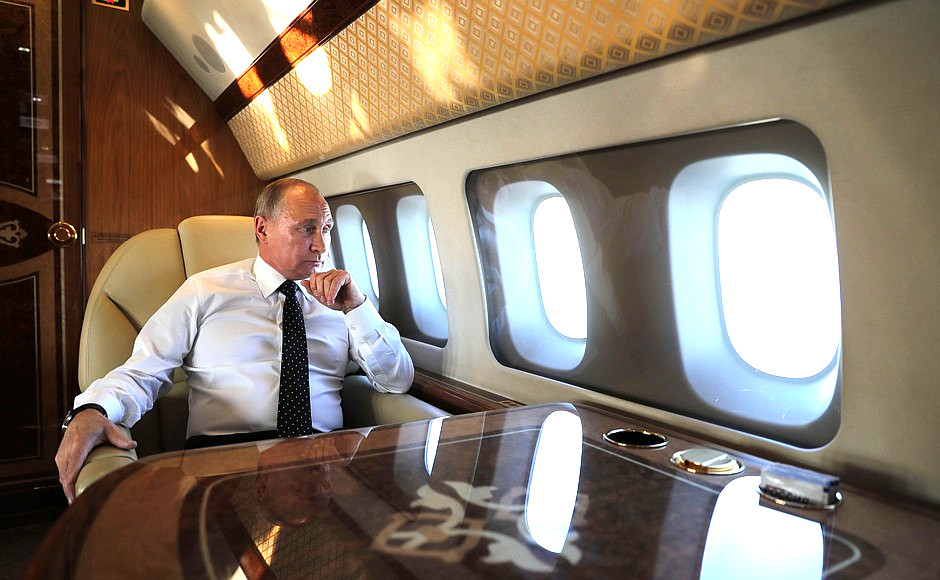
Now, Sisi may be inclined to turn toward Russia yet again following the U.S. government’s decision to recognize Jerusalem as the capital of Israel, a decision that countries across the Arab and Muslim worlds have almost universally criticized. In a statement on Dec. 5, 2017, the Egyptian president’s office said that Sisi had warned Trump not to “complicate” the situation in the Middle East and warned against “taking measures that would undermine the chances of peace in the Middle East.”
Russia had already been increasingly interested in taking advantage of these political spats to increase its own standing in Egypt and potentially secure new strategic economic and military deals, something we at the War Zone have already written about in great detail here.
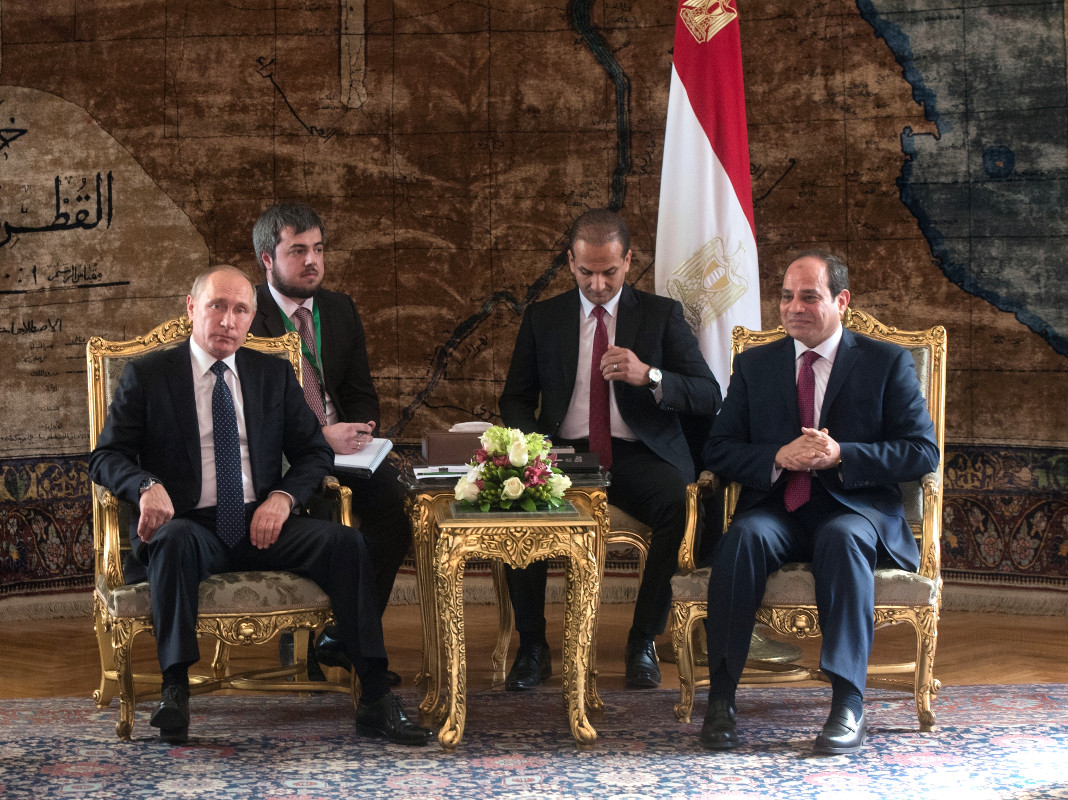
During Putin’s visit, he formalized plans to help Egyptian authorities establish their first nuclear power plant, which could have a total of four reactors in its final configuration. That work will cost at least $21 billion and Russia’s state nuclear company Rosatom says the initial construction will be done sometime between 2028 and 2029. In addition, the two countries agreed to resume direct commercial flights between Cairo and Moscow, which had stopped after ISIS blew up a Russian airliner in 2015.
At least initially, there were no new announcements about the sale of military hardware or basing rights, but Egypt has steadily been looking to purchase more advanced systems from Russia and make other military cooperation deals. Earlier in 2017, Egyptian authorities had also consulted with their Russian counterparts about the sale of communications and other systems for its pair of French-made Mistral-class amphibious assault ship.
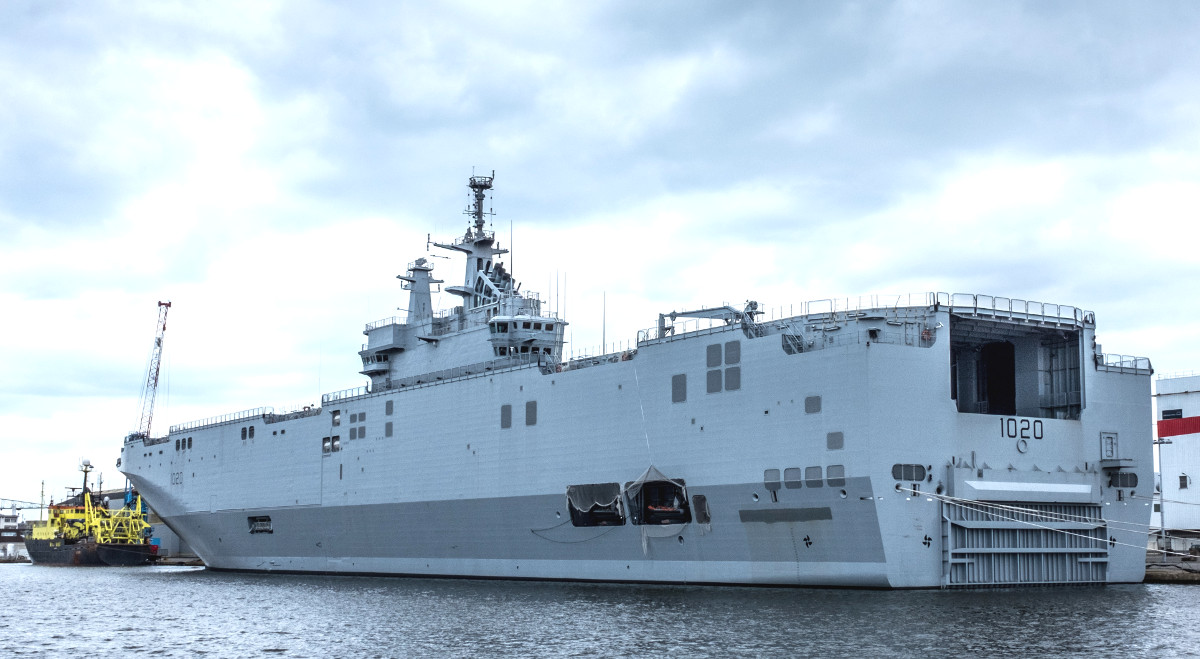
Originally, these ships were supposed to go to Russia, but France blocked the deal in response to Russia’s intervention in Crimea in 2014. Egypt subsequently bought them and Russian officials have since offered to install many of the systems they had previously intended to fit on the vessels. In addition, the Egyptian military has bought Russian-made Kamov Ka-52, and is expected to buy K models as well, the same type Moscow had originally planned to deploy on the ship. The sale of advanced MiG-29s, also known as the MiG-35, to Egypt also marked a change in what had been the country’s ever-growing reliance on American air combat hardware.
Military cooperation between the two countries is growing elsewhere, as well. In August 2017, Russian and Egyptian paratroopers announced plans for a first of its kind joint exercise in Russia. Two months later, the Russian destroyer Vice-Admiral Kulakov made a very visible stop in the port of Alexandria to replenish supplies of food and water during a cruise that reportedly covered 15,000 miles.
There have been reports that Russian personnel are in Egypt, potentially to help out with the fight against ISIS in Sinai. Now that the Kremlin has claimed victory over the terrorists in Syria, any additional offers of help might seem especially attractive.
Maybe most importantly from a strategic standpoint, a deal has been in the works that would give Russian aircraft basing and airspace rights in Egypt, a move that would allow Russia to rapidly deploy large amounts of airpower to the nexus between Africa and the greater Middle East. Combined with Russia’s long term holdings in Syria, this would give Moscow far more military influence and tactical flexibility over the region as a whole.
After the meeting in Cairo, Putin boarded the Il-96 and headed to his third stop of the whirlwind day to meet with Turkish President Recep Erdogan in Ankara. As with Egypt, Russia has similarly expanded its ties with Turkey in recent years due to strained relations with the United States following the July 2016 coup attempt, as well as over the U.S. government’s support for Kurdish groups battling ISIS in Syria. Russian and Turkish authorities have been working together to craft so-called “de-escalation zones” in northern Syria, which have effectively acted as buffers to keep the Kurds contained in various cantons and limit the possibility of a de facto independent Kurdish state emerging.

Notably, in July 2017, Turkey announced it was moving ahead with the purchase of the Russian S-400 surface-to-air missile system. This has irked its fellow NATO-members, especially the United States, who say it doesn’t meet the alliance’s standards and could pose a security risk by giving the Kremlin an opportunity to test some of its latest air defense weaponry against against top-of-the-line western aircraft. Turkey is a member of the U.S.-led F-35 Joint Strike Fighter program and is in the process of developing its own fifth generation stealth fighter with help from the United Kingdom.
On top of that, Turkey, like Egypt, is concerned about the U.S. government’s decision regarding the status of Jerusalem, which Erdogan called a “red line” for relations with Israel. In November 2017, the Trump administration had reportedly begun scaling back support for the Kurds in what many viewed as an attempted to mend ties with the Turkish government. However, the Jerusalem decision has given the Kremlin an all new opening to drive a wedge between the two countries.
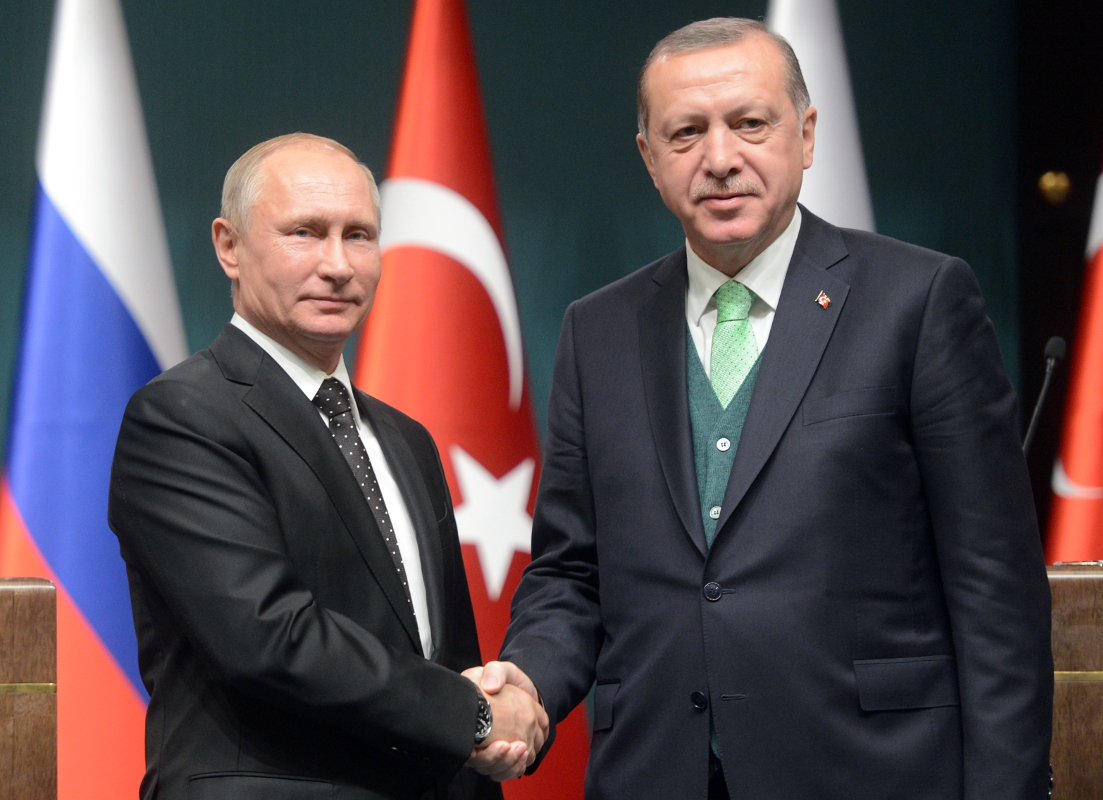
At home, Putin is undoubtedly hoping to use his claimed victory in Syria, as well as Russia’s growing international relevance in the Middle East, to boost his stature ahead of what will almost certainly be a very controversial presidential election in 2018. Russian authorities have already announced they will bar prominent opposition politician Aleksei Navalny from even running in the polls after his disputed conviction for alleged financial crimes.
“Yes, I will run for the president of the Russian Federation,” Putin said earlier in December 2017, and is apparently considering running as a independent candidate.”Russia will move only ahead and in this advance nothing and nobody will stop it.”
Whatever happens, this trip can be viewed as almost a blueprint for a grander regional strategy Moscow is working very hard to realize. Above all else it seems clear that Putin is still eager to present Moscow as an alternative to with Washington in the Middle East and elsewhere. His warm welcomes in Syria, Egypt, and Turkey show that he is having a certain amount of success in this endeavor so far.
Contact the author: joe@thedrive.com
